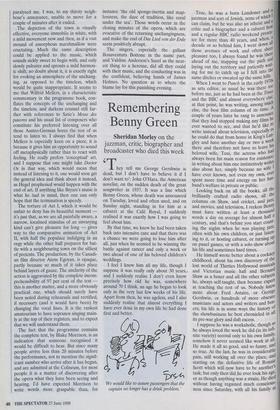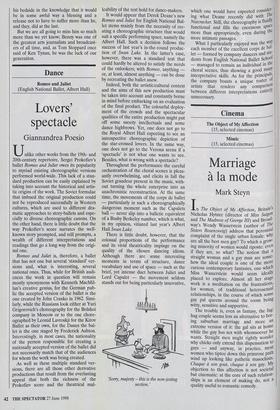Remembering Benny Green
Sheridan Morley on the jazzman, critic, biographer and broadcaster who died this week They tell me George Gershwin is dead, but I don't have to believe it if I don't want to': John O'Hara, the American novelist, on the sudden death of the great songwriter in 1937. It was a line which Benny Green, whose death was announced on Tuesday, loved and often used, and on Sunday night, standing in for him at a cabaret at the Café Royal, I suddenly realised it was exactly how I was going to feel about him.
By that time, we knew he had been taken back into intensive care and that there was a chance we were going to lose him after all, just when he seemed to be winning the battle against cancer and only a week or two ahead of one of his beloved children's weddings.
I feel I knew him all my life, though I suppose it was really only about 30 years,- and I suddenly realise I don't even know precisely how old he was, somewhere around 70 I think, an age he began to look only in the very last few weeks of his life. Apart from then, he was ageless, and I also suddenly realise that almost everything I have ever done in my own life he had done first and better.
`We would like to assure passengers that the captain no longer has a drink problem.'
True, he was a born Londoner and jazzman and sort of Jewish, none of which I can claim, but he was also an atheist and critic and a biographer and a cabaret host and a regular BBC radio weekend presen- ter for more than 40 years, and when, na decade or so behind him, I went down au those avenues of work and often sheer pleasure too, I always found he was there, ahead of me, mapping out the path and laying out the territory and patiently Wad- ing for me to catch up as I fell into the same ditches or sweated up the same hills. When I went to Punch in the early 197°5 as arts editor, as usual he was there. too before me, just as he had been at the Times and the BBC and almost everywhere else, ,: at that point, he was writing, among nuleA' else, the best film column of its time. r" couple of years later he rang to announce that they had stopped making any films he ever wanted to see, and that he'd like t° write instead about television, especially he could do that from home in King's pit gley and have another day or two a wee, there and therefore not have to leave 111,1 beloved wife, Toni, the actress who had always been his main reason for existence, in writing about him one instinctively writers also about her, simply because no wife , have ever known, not even my own, ever spent more time and energy on her hos' band's welfare in private or public. Looking back on all the books, all the brilliantly crafted radio shows, all the columns on Shaw, and cricket, and ja0' and movies, and television, I reckon Ben must have written at least a thousand words a day on average for almost half a century, and that's before you start count- ing the nights when he was playing jazz' often with his own children, or just listen- ing to it, or hosting cabaret, or turning oP on panel games, or with a solo show about his life and sometimes hard times.
He himself wrote better about a cockney childhood, about his own discovery of the lost world of Thirties Hollywood musicals and Victorian music hall and Bernard Shaw as a boxer and all the other subjects he, always self-taught, then became expert at teaching the rest of us. Nobody knew more about Fred Astaire, or George Gershwin, or hundreds of more obscure musicians and actors and writers and box' ers; his life is in some ways the history of, the showbusiness he best chronicled in all its pre-war glory and daft excess. I suppose he was a workaholic, though as he always loved the work he did (in its inft" nite variety) second only to his own familY- somehow it never seemed like work at all. He made it all so good, and so funny, and so true. At the last, he was in considerable pain, still working all over the place, and starting on the definitive life of Ronnie Scott which will now have to be another task; but only then did he ever look his age- or as though anything was a strain. He died without having regained much conscious- ness since Saturday, with all his family at his bedside in the knowledge that it would be in some awful way a blessing and a release not to have to suffer more than he, and they, did at the last.
But we are all going to miss him so much more than we yet know; Benny was one of the greatest arts journalists and broadcast- ers of all time, and, as Tom Stoppard once said of Ken Tynan, he was the luck of our generation.



























































 Previous page
Previous page